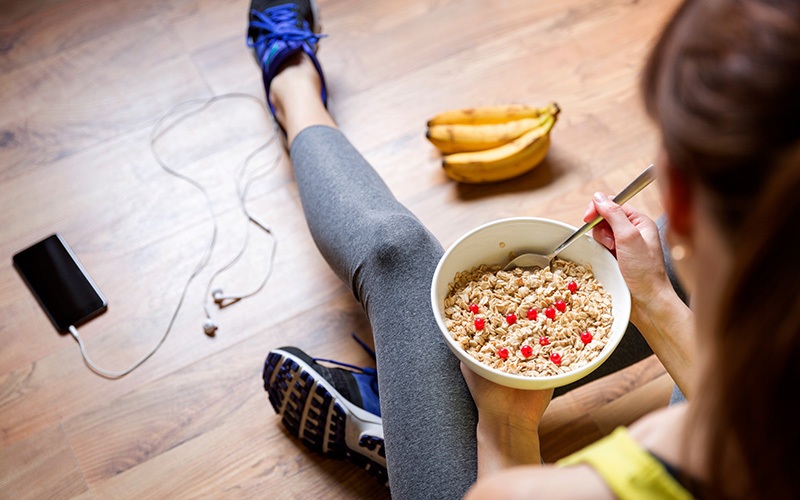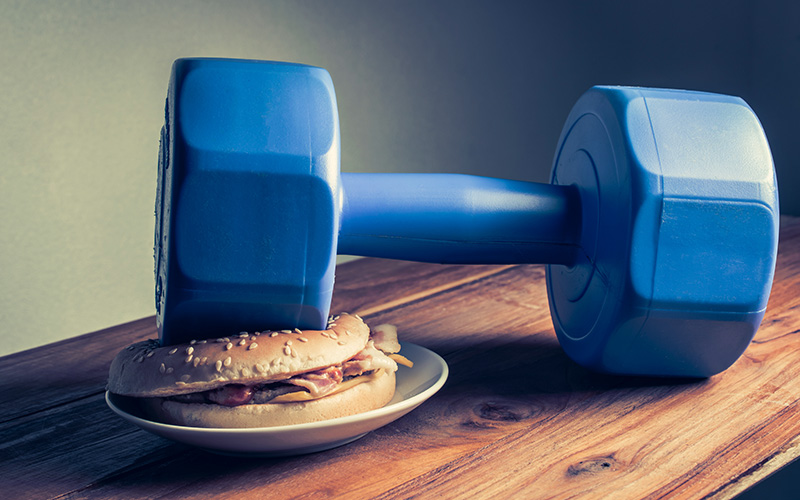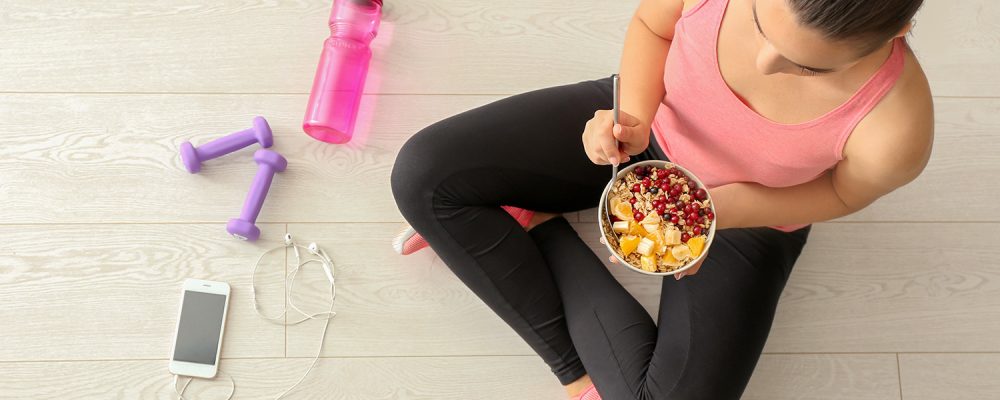Understanding the importance of post-workout nutrition is crucial for anyone engaged in physical activity. Running, cycling, swimming, soccer, or weightlifting are some noteworthy common workout activities. Completing these exercise sessions marks not the end, but a critical phase in any fitness journey.
The body needs to refuel, rehydrate, and recover from the physical exertion it’s just undergone. Thus, what’s eaten after a workout is not a trivial matter; it plays a pivotal role in the body’s ability to recover effectively.
So, let’s find out what we should include in our post-workout meal choices. But before that, let’s learn a bit more about why exactly it’s important to consume a supplementary meal after a workout.
Why It’s Important to Eat After a Workout
The body is like an engine that needs refueling when it is low on fuel. Here’s a fact: when working out, whether it’s hitting the pavement for a run, doing a cycling session, or lifting weights, the body is using up fuel from muscles, specifically something called glycogen [1].
Plus, all that exertion is putting the muscle proteins under stress and causing a bit of wear and tear. In this case, eating a post-workout meal may save some trouble. So, grabbing a bite after finishing a workout may be the key part of a fitness routine and refueling.
So, what’s the best food to grab to replenish energy? Carbs may help to restock the glycogen to lift up any energy that’s lost [2]. And protein? It can fix up those muscles that have just been placed under stress. However, keep in mind that this isn’t just about bulking up; it’s more about muscle repair and energy recovery.
Eating right after a workout helps reduce muscle soreness, cuts down on recovery time, and builds up necessary strength for whatever someone is tackling next. Skipping this step can leave someone lagging behind in their fitness goals.
So, think of that post-gym snack or meal as part of an exercise plan. It’s just as important as the workout itself.
What to Eat After a Workout

Post-workout nutrition is vital for recovery and muscle growth. Usually, it can be a mix of protein and carbohydrates to repair muscles and replenish energy. Healthy protein sources include lean meats, eggs, or plant-based options like tofu and legumes. As for carbs, whole grains, fruits, or starchy vegetables will do the trick. Healthy fats, which might support additional recovery, can also be added in. Let’s break down the ideal nutritional ingredients for a post-workout meal:
Proteins
Protein is an essential powerhouse nutrient for repairing and rebuilding muscle tissues. These tissues get stressed during exercise. Without muscle relaxation and repair, the muscles may not have enough stamina to make it through another training session.
So, including protein in the post-workout meal may help to reduce muscle soreness and aid in a quicker comeback. As for optimal sources of protein, choices such as lean meats like chicken or turkey, fish like salmon or tuna, and dairy products like Greek yogurt or cottage cheese will work just fine.
Additionally, plant-based protein sources that include tofu, tempeh, legumes, and more can also be eaten. On the other hand, many people go for meal replacements because they offer a fast protein recovery and are convenient on the go.
Let’s have a clear look at some of the protein-rich meal options that might be beneficial to follow a post-workout nutrition demand.
- Grilled Chicken Salad: A hearty salad topped with grilled chicken breast, mixed greens, and a choice of vegetables.
- Salmon and Quinoa: Baked or grilled salmon served alongside quinoa and steamed vegetables.
- Greek Yogurt Parfait: Layered Greek yogurt with granola, nuts, and fresh berries.
- Tofu Stir Fry: Firm tofu stir-fried with a variety of colorful vegetables and a soy-based sauce, served over brown rice.
- Egg and Avocado Toast: Whole grain toast topped with scrambled or poached eggs and sliced avocado.
- Turkey and Cheese Wrap: Whole wheat wraps filled with sliced turkey breast, cheese, lettuce, and tomatoes.
- Cottage Cheese Bowl: Cottage cheese served with fruit, such as pineapple or peaches, and a sprinkle of nuts or seeds.
- Beef and Vegetable Skewers: Grilled skewers of lean beef and vegetables, seasoned to taste.
- Lentil Soup: A hearty soup made with lentils, carrots, onions, and celery, seasoned with herbs.
- Protein-Rich Meal Replacements: Protein-packed meal replacements, like meal replacement bars or shakes, aren’t just great for boosting post-workout energy, but they also help satisfy sugar cravings. In fact, they can be a nutritious addition that can easily be integrated into any weekly meal plan.
- Tuna Salad: A salad of canned tuna (in water), mixed with a bit of Greek yogurt or mayo, served on whole grain bread or with a side of mixed greens.
Carbs
Besides protein, carbohydrates play a major role in post-workout glycogen recovery. Thus, consuming carbs after a workout not only aids in energy restoration but also supports muscle recovery. Ideal carbohydrate-rich foods for post-workout meals include whole grains like quinoa and brown rice, starchy vegetables like sweet potatoes, fruits like bananas and berries, and legumes.
These foods provide a sustained energy release that may help in effective recovery while preparing the body for the next workout session. So, incorporating these carb options into a post-exercise nutrition plan ensures that the body gets the right fuel it needs to recharge. Let’s have a look at some of the ideal carb options for a post-workout meal selection.
- Sweet Potato Bowl: Baked sweet potatoes topped with black beans, avocado, and a sprinkle of cheese.
- Chocolate Milk Smoothie: Blend chocolate milk with a banana and a scoop of peanut butter for a quick carb and protein mix.
- Quinoa Salad: A cold quinoa salad with chopped vegetables, feta cheese, and a lemon vinaigrette.
- Fruit Salad: A mix of pineapple, berries, banana, and kiwi, possibly with a dollop of Greek yogurt.
- Rice Cake Sandwich: Rice cakes layered with almond butter and sliced bananas.
- Brown Rice Stir Fry: Brown rice served with a mix of stir fried vegetables and a protein source like tofu or chicken.
- Oatmeal Delight: Oatmeal topped with sliced almonds, honey, and fresh berries.
- Baked Potato Bar: Baked potatoes with options for toppings like cottage cheese, steamed broccoli, and salsa.
- Whole Wheat Pasta Dish: Whole grain pasta tossed with olive oil, cherry tomatoes, and basil.
- Grilled Vegetable and Hummus Whole Grain Sandwich: A whole grain bread sandwich filled with grilled vegetables and hummus.
- Edamame Snack: Boiled or steamed edamame pods, lightly salted for a quick post-workout snack.
Fats
Healthy fats are a crucial component of post-workout nutrition, especially if someone is strictly focusing on losing weight. Fats provide a slower, more sustained source of energy.
While carbs help replenish glycogen stores, fats are key for reducing inflammation and aiding in the absorption of fat-soluble vitamins. Fats also help low-carb diet followers to reach the ketosis state.
Moreover, incorporating healthy fat sources into a post-workout meal may support muscle health and energy balance. Ideal fat-rich foods for post-exercise include avocados, which offer beneficial monounsaturated fats, and potassium for muscle function.
Nuts and seeds like almonds and chia seeds that are packed with omega-3 fatty acids, and that are known for their anti-inflammatory properties, can also be considered. Some people also like olive oil, which is rich in heart-healthy fats and antioxidants.
Adding these types of fats to a post-workout meal ensures a well-rounded recovery. They contribute to the body’s healing process and aid in maintaining energy levels.
Eventually, the body can prepare for its next exercise session pretty fast.
Let’s see some of the fat-rich foods that best suit post-workout meal plans.
- Avocado Toast: Whole-grain bread topped with smashed avocado, a sprinkle of salt, and chili flakes.
- Nut and Seed Mix: A mix of almonds, walnuts, pumpkin seeds, and sunflower seeds, possibly with dried fruit.
- Salmon Avocado Salad: A salad with grilled salmon, avocado, mixed greens, and a vinaigrette dressing.
- Greek Yogurt with Chia Seeds: Full-fat Greek yogurt mixed with chia seeds and a drizzle of honey.
- Olive Oil Drizzled Vegetables: Steamed or roasted vegetables drizzled with extra virgin olive oil and herbs.
- Cheese and Whole Grain Crackers: A single serving of cheese with whole grain crackers is quite good for a balanced snack.
- Nut Butter Smoothie: A smoothie made with almond or peanut butter, banana, and milk or a milk alternative.
- Flaxseed Oatmeal: Oatmeal prepared with milk or water, stirred with ground flaxseeds, and topped with berries.
- Dark Chocolate: A few squares of dark chocolate, preferably with a high percentage of cocoa.
- Coconut Yogurt Parfait: Layered coconut yogurt with nuts, seeds, and fruit for a dairy-free option.
- Egg Salad with Avocado: Egg salad made with avocados instead of mayo, served on whole grain toast or lettuce wraps.
What To Avoid Eating After A Workout

After completing a workout, it’s essential to mindfully consume certain foods and drinks, as they can negatively impact the recovery process. High sugar foods, while tempting for a quick energy boost, can cause rapid spikes in blood sugar levels, leading to energy crashes that are counterproductive for recovery. Similarly, foods high in unhealthy fats, especially deep-fried items, can slow down the absorption of nutrients and are harder to digest.
- Avoid Highly Processed Foods: These foods often contain preservatives and lack nutritional value. They don’t significantly benefit muscle recovery or replenishment.
- Avoid Alcohol Post-Workout: Alcohol can interfere with muscle synthesis. It negatively affects the body’s recovery process by impacting hydration.
- Moderate Caffeine Intake: While caffeine might seem like a good energy booster, excessive intake can be counterproductive. Too much caffeine may lead to dehydration, which will ultimately hinder recovery.
- Focus on Nutrient-Rich Foods: Choose foods that are rich in nutrients for better post-exercise nourishment. A combination of different nutrition might be better for the expected energy boost.
- Hydrate Effectively: Drink water or electrolyte-balanced hydration drinks for proper hydration. These are more effective for post-exercise recovery than alcohol or high-caffeine beverages.
Healthy Post-Workout Meals and Snacks
For post-workout foods, it’s important to choose meals and snacks that combine the right balance of proteins, carbohydrates, and healthy fats. Here are some healthy post-workout meals and snacks that can help the body recover efficiently and prepare it for the next round of physical activity:
- Grilled Chicken and Quinoa Salad: A protein-packed meal with the added benefits of fiber-rich quinoa.
- Greek Yogurt with Berries and Granola: A perfect mix of protein, carbs, and a little bit of healthy fat.
- Protein Shake with Banana: Ideal for on-the-go nutrition, providing both protein and quick carbs.
- Whole Grain Turkey Wrap: Combines lean protein with whole grains for sustained energy.
- Cottage Cheese and Pineapple: A great combination of protein and enzymes that aid in digestion and recovery.
- Banana and Peanut Butter on Whole Grain Bread: This offers a good mix of protein, healthy fats, and carbs.
- Tuna Salad on Whole Grain Crackers: A light, yet fulfilling option, rich in protein and omega-3 fatty acids.
- Hummus and Veggie Sticks: A great plant-based protein source that pairs well with the carbs in vegetables.
- Egg Omelette with Avocado and Spinach: A nutrient-dense meal providing proteins, fats, and antioxidants.
- Sweet Potato and Black Bean Bowl: Offers a vegan-friendly mix of complex carbs and protein.
- Protein Pancakes: Protein pancakes are pancakes enriched with protein powder or other protein sources, providing a higher protein content compared to traditional pancakes.
- Protein Energy Balls: Protein energy balls are bite-sized snacks made with ingredients like oats, nut butter, and protein powder, offering a convenient and protein-rich source of energy.
The Best Time to Prepare A Post-Workout Meal
Almost as important as what is eaten, the timing of a meal after a workout session holds significant importance.
Consuming the right nutrients shortly after exercise can greatly enhance the workout recovery process.
The general guideline is to eat within 45 minutes to an hour after a workout. Athletes and fitness enthusiasts often refer to this time frame as the ‘anabolic window,’ during which the body, especially the muscles, is most responsive to nutrients and can utilize them for recovery.
For those who prefer a solid meal, planning ahead can ensure that there’s a balanced meal ready within this window. However, if preparing a meal immediately post-workout is not feasible, consider having a small snack right after exercise, followed by a more substantial meal a bit later. This approach ensures that the body is provided with the necessary nutrients in a timely manner, enhancing muscle recovery and energy replenishment.
The Takeaway
In the end, understanding and implementing effective post-workout nutrition is a crucial aspect of any fitness approach.
After exercising, the foods consumed play a pivotal role in replenishing energy, repairing muscles, and ensuring overall recovery.
Balancing proteins, carbohydrates, and healthy fats in post-workout meals or snacks can significantly enhance the benefits of any physical activity. Whether it’s a full meal or a quick snack, what matters most is providing the body with the right nutrients at the right time. So, embracing these nutritional strategies not only supports physical training goals but also contributes to long-term health upgrades.
References
- Bergström, J., Hermansen, L., Hultman, E., & Saltin, B. (1967). Diet, muscle glycogen, and physical performance. Acta physiologica scandinavica, 71(2‐3), 140-150.https://doi.org/10.1111/j.1748-1716.1967.tb03720.x
- Costill, D. L., Sherman, W. M., Fink, W. J., Maresh, C., Witten, M., & Miller, J. M. (1981). The role of dietary carbohydrates in muscle glycogen resynthesis after strenuous running. The American Journal of clinical nutrition, 34(9), 1831-1836.https://doi.org/10.1093/ajcn/34.9.1831
RV Team
* Reviewology is in partnership or collaborates with top brands highlighted on this site, including those occupying the top ranking positions.
Additionally, we earn affiliate commissions from products showcased on this website when you make a purchase through the provided links on Amazon or the company website directly.
We appreciate your support using our links to purchase your favorite brands or newly discovered brands.
Latest updates
I Thought I’d Always Feel Tired, Fat, and Forgotten—Until This
310 Greens vs AG1
The Truth About 310 Greens: A No-Nonsense Review of This Popular Supplement
Popular
I Thought I’d Always Feel Tired, Fat, and Forgotten—Until This
310 Greens vs AG1
The Truth About 310 Greens: A No-Nonsense Review of This Popular Supplement
© 2024 Reviewology. All Rights Reserved.
